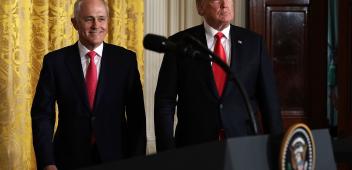Why the G20's growth pledges have foundered
This piece was originally published in the Australian Financial Review

Executive Summary
We are now 2½ years into the five-year window given for the G20's growth strategies. Remember the growth strategies? They were the G20's commitment, made during Australia's presidency of the body, to more than 1000 structural reforms. The IMF and OECD evaluated the reforms, and declared they would lift G20 country GDP by more than 2 per cent above the October 2013 baseline by 2018.
This commitment has been one of the G20's banner declarations in recent years but it looks like a dud.
Global growth is slowing, and it continues to disappoint. This week the International Monetary Fund once again downgraded its global growth forecasts.
One could argue we are being unfair, that we are ignoring the changing counterfactual; that without the growth strategies global GDP would be even sicker.
But that belies what we have seen from the IMF.
Since finance ministers and central bank governors made their "bold commitment" in Sydney in February 2014, the IMF has issued eight updates to its forecasts of the world economy.
Hundreds of pages have been devoted to detailing those forecasts. They have only mentioned the growth strategies once - in the context of a scenario which showed the strategies having little effect by 2018, and left the role of the strategies in the central forecasts opaque.
Our reading is that the IMF has either accounted for the fact the actions would have, or in some cases already had, gone ahead in G20 countries regardless of the agreement, or they suspect big, new, additional commitments are not going to be implemented. In either case, it leaves the G20 looking like a damp squib.
After the Antalya leaders' summit, a three-page report was released on the growth strategies. The circumstances of the report's release were telling. All the leaders had already boarded their planes home. While the leaders were resting up after an intense few days of talks, the three-page note incredibly declared that the measures implemented so far should raise GDP by 0.5 per cent this year and 0.8 per cent in 2018, which is within spitting distance of being on track.
The dissonance with the IMF's forecasts leaves us discombobulated.
Perhaps we could check progress on the growth strategies ourselves? Nope. The 1000-plus commitments were kept 'within the tent'. And the modelling that gave the magical 2 per cent was bespoke modelling. Nobody else in the world has the resources or information to do that.
This situation does nothing to enhance the credibility of the G20. Much as the credibility of central banks is under the spotlight in their fight to push inflation up, the credibility of the G20 should be scrutinised.
And like central banks, the G20 is nothing without credibility. The G20 needs buy-in from all members, so that when finance ministers, leaders, central bank governors, or other officials return back to their homes after of the pageantry, they will implement their reforms and know their counterparts will do the same.
We aren't in that place right now. We are far from that place. The finance ministers (which in the Australian vernacular translates to treasurers) of the G20 will be meeting at the same time as the spring meetings of the World Bank and the IMF in Washington DC this week. But Scott Morrison isn't showing up. That's not buy-in. That's avoidance, and a substantial step towards the withering of the G20. What is to be done?
Seasoned G20 watchers will tell you the problems. A big one is the G20 tries to do too much. It is seen as a hammer for every nail, a solution for every international problem. Each president wants to put pet topics on the agenda and leave a legacy, and removing items in a voluntary, consensus body is notoriously difficult.
As a result the agenda expands into more marginal areas, there's too much talk, and focus is diverted away from what the G20 is designed to do. We would argue that is to enhance co-operation in areas where there are big spillovers, that can't be addressed by countries acting unilaterally, and where countries have the capacity to co-operate.
The growth strategies simply do not fall into those buckets. It is not as if countries hadn't considered the idea of structural reforms before. Structural reforms face barriers in the internal political economy of each country. It is not as if a commitment from other countries to implement structural reforms will alter that political economy balance.
The world will be watching Washington for signs of life among G20 finance ministers, at least from the ones that are attending. If life is not detected, fewer will watch next time. And the time after that. Soon digging the G20 out of a rut of irrelevance could prove impossible.
Leon Berkelmans is international economy program director at the Lowy Institute for International Policy. Tristram Sainsbury is project director in the G20 Studies Centre, Lowy Institute for International Policy and a visiting fellow at Renmin University.



